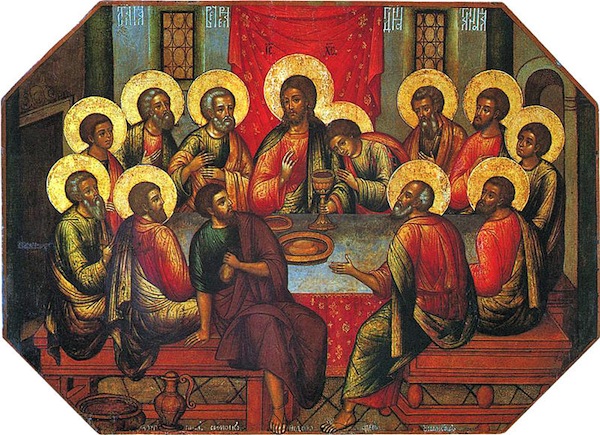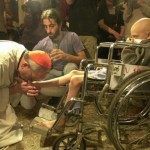“Jesus, knowing that the Father had given all things into his hands, and that he had come from God and was going back to God, rose from supper… he poured water into a basin and began to wash the disciples’ feet and to wipe them with the towel that was wrapped around him. He came to Simon Peter, who said to him, “Lord, do you wash my feet?” Jesus answered him, “What I am doing you do not understand now, but afterward you will understand.” Peter said to him, “You shall never wash my feet.” Jesus answered him, “If I do not wash you, you have no share with me.” Simon Peter said to him, “Lord, not my feet only but also my hands and my head!” Jesus said to him, “The one who has bathed does not need to wash, except for his feet, but is completely clean. And you are clean, but not every one of you.” … A new commandment I give to you, that you love one another: just as I have loved you, you also are to love one another. By this all people will know that you are my disciples, if you have love for one another.” (from John 13)
*************************
As Holy Week days go, Maundy Thursday is often overshadowed by Palm Sunday, Good Friday, and Easter. The relative inconvenience of a Thursday evening service, on an already busy holiday week, means that some churches do not hold a Maundy Thursday service (Protestants like me tend to call it Maudy Thursday, while Catholics tend to call it Holy Thursday). Those who do sometimes see low attendance. But the day’s commemoration of the Last Supper is hugely significant. There is something truly moving about the somber foreboding of Christ’s last evening with his closest followers and friends, a striking juxtaposition of intimate communion and imminent death. While the highlight of the holiday is Christ’s institution of the Lord’s Supper, an equally attended-to aspect is John’s account of Christ washing his disciples feet.
The word “Maundy” is derived from the Latin word “mandatum,” which means “commandment,” and refers specifically to Jesus’ charge, “A new commandment I give to you, that you love one another: just as I have loved you, you also are to love one another.” Christ delivers this charge after washing his disciples’ feet —a dramatically humble and self-sacrificial gesture typically performed by servants. Many foot-washing ceremonies encourage action upon Jesus’ charge. We are to follow Christ’s command to love one another, by literally and figuratively washing each other’s feet. This point is relatively simple to grasp. It is important to humble ourselves towards one another and demonstrate love in concrete acts of self-sacrifice, sometimes involving self-degradation. Foot washings often occur on missions trips as an object lesson to the people being served, or even at weddings as a symbol of the couple’s vows. One meaning of Maundy Thursday, then, is a charge to emulate Christ’s self-sacrifice.
I’ve had a longstanding affinity for the Maundy Thursday service. During college I was without midweek transportation to the church I usually attended, so during Holy Week, I visited another congregation within walking distance of campus. Because of this, my freshman year, I didn’t realize their Maundy Thursday service involved footwashing until I arrived. I gladly participated in the rest of the service, but when the time for footwashing came, I opted out. I didn’t know the rector very well, and I thought that I understood the point of footwashing fine without participating. By senior year, I had become more mentally accustomed to the concept, and decided to take part. I very clearly remember being truly surprised that the water used for the footwashing was warm—I’d subconsciously imagined it would be cold and unpleasant, utilitarian and ceremonial. This mundane surprise triggered the parallel realization that the point of Maundy Thursday, and of foot washing, was not only that we are meant to wash others’ feet, but that we must first allow Christ to wash ours.
This point should be readily evident from the John passage, but of course I hadn’t noticed it before. Again, Christ charges, “Just as I have loved you, you are to love one another.” It is because Christ has first loved us that we are able to extend grace to others. This message is echoed throughout scripture – “In all these things we are more than conquerers through him who loved us” (Rom 8:37), “In this is love, not that we have loved God but that he loved us and sent his Son to be the propitiation for our sins” (1 John 4:10), “And walk in love, as Christ loved us and gave himself up for us, a fragrant offering and sacrifice to God” (Eph. 5:2). Christ’s self-sacrifice for us, from the footwashing to the Passion itself, enables us to “walk in love.” To relinquish self-sufficiency and willingly receive God’s grace is central to the Gospel. That’s a truth I had affirmed for years. But yet, when it came to action, I sympathized with Simon Peter, who emphatically exclaimed, “You shall never wash my feet!,” not realizing that it would be a total blessing, rather than an act of resigned submission.
Holy Week activities are rich with meaning, but it can be easy to transform their symbolism into simple lessons for Christian living. The core of the holiday lies in meditating upon Christ’s sacrifice on our behalf and his resulting victory over sin. Worshipping corporately during this time allows liturgy to transform us, teaching old lessons in new ways and providing an opportunity for us to receive God’s grace experientially. From the basis of this worship, Christ’s love fuels our service to others and the advancement of his kingdom.
[Picture of the Last Supper Courtesy of Wikipedia]













